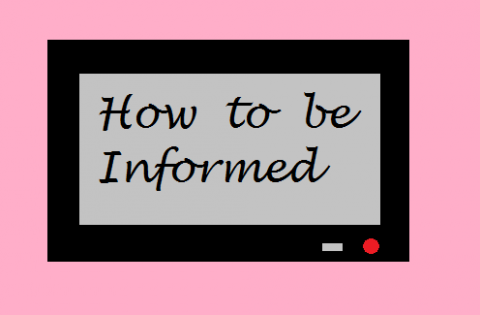How to be informed: The do’s and don’ts
May 20,2015
As an aspiring journalist, I’m a little obsessed with news. Whether it’s local or national news, I’m probably interested in it, and I likely have some sort of opinion on it. However, since I know not everyone loves news, I understand that it can be hard to stay informed.
We can all say we don’t have time to acquaint ourselves with current events. We could also claim that we will never understand the social and political issues at hand, so there is no use trying to learn.
The truth is, staying informed is much easier than you think. However, there are some no-no’s when it comes to staying informed that can steer you off the path to trustworthy information. Here are a few do’s and don’ts that will help you stay on top of the news.
Do: Read newspapers and watch news broadcasts.
Newspapers and news broadcasters exist for one main purpose: to inform the public about the news. If you are not taking advantage of these excellent and credible information sources, you are missing out on an easy way to learn about what’s happening in the world around you.
Maybe you think print newspapers are old-fashioned or too expensive. A simple solution is to look online for your local newspaper’s website or Facebook page. These online sources will allow you to access many of the same articles that are included in the print edition, although if you’re looking for an opinion from a newspaper writer, buying the print edition of the paper still has many great benefits.
Don’t: Rely on hearsay.
You may have heard from a friend or family member that some bizarre event has occurred in the news. You go tell all of your friends or post about it on social media, only to find out that nothing of the sort happened; you were just terribly misinformed. This is a classic case of rumor-reliance.
One of the first things journalism students are taught is to never rely on rumors or trust wild and over-the-top proclamations about the news. In comparison to most of the news, wild and crazy stories do not happen that often, and even if your friends are talking about something more believable, it is still good to investigate it to make sure the talk is accurate.
Do: Delve deeper into certain topics.
Sometimes reading one article about a certain topic just isn’t good enough. You need to find more information about some subjects in order to have a better grasp of what’s going on.
I’ll use the example of government news. Oftentimes news about the inner-workings of government will be spread over multiple articles or news broadcasts. Therefore, if you’re only reading or listening to one of these news reports, you will probably be missing out on some key information covered in an earlier or later report.
That is why you should check up on certain issues periodically to see if any new developments have been reported or if there were any older developments that you might have missed.
Don’t: Trust your own under-informed interpretations.
Whatever you do, do not form opinions about news or current events based on bits and pieces of information that you’ve accidentally stumbled upon throughout your day. The main reason for this is because you won’t know the whole story unless you sit down and actually read the whole story or watch an entire broadcast about the story.
Headlines and bold television script will give you a few words about an event, but they aren’t going to give you all the information you need to form an educated opinion.
By implementing these tips, you should become a more informed citizen, without making a huge time commitment. As someone who is passionate about the news, I will likely be sharing more news-related articles with you in the future. In the meantime, take a look at some of your local and national news sources, and get informed!






